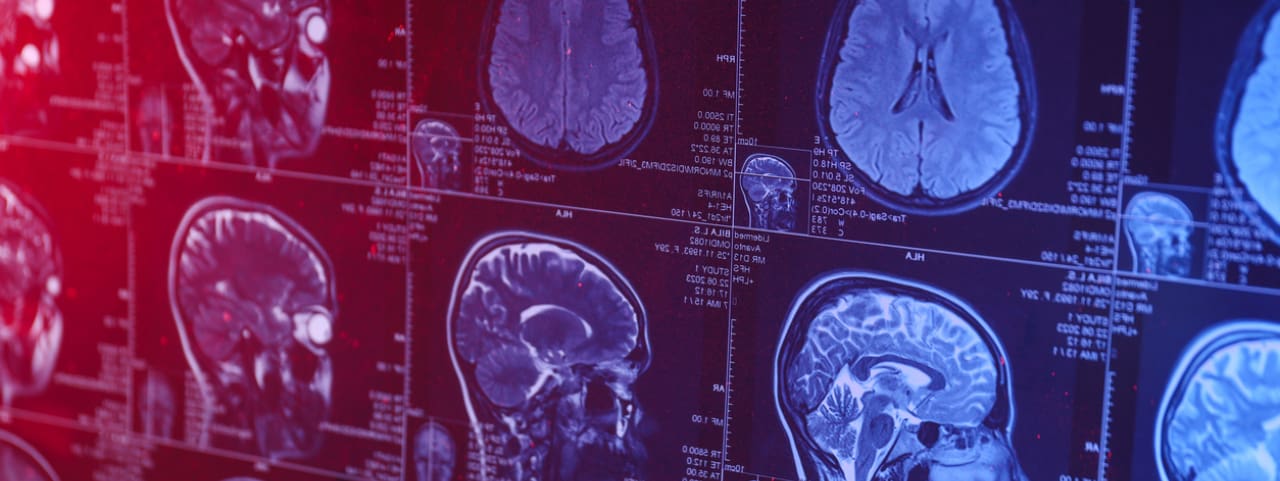The effects of cannabis and CBD on brain health
5 min read



Cannabis can have both positive and negative effects on brain health.
Some research suggests that cannabis may help with certain brain-related health conditions, including epilepsy, traumatic brain injury (TBI), and anxiety.
However, frequent cannabis use can also affect memory and other essential brain functions.
If you use cannabis, understanding how it affects brain health can help you weigh its potential benefits and risks.
Get your medical marijuana card
Connect with a licensed physician online in minutes.
Larger purchase limits Access to higher potency strains Save up to 40% on product taxes Enhanced legal protection
What does weed do to your brain?
The effects of cannabis on the brain are complex, and researchers are still studying its short- and long-term effects.
Certain compounds in cannabis, including tetrahydrocannabinol (THC) and cannabidiol (CBD), interact with receptors in the brain that influence:
- Cognitive function, including memory, focus, and decision-making
- Mood and emotions, including stress response and emotional processing
- Neurological function, including nerve activity and neurogenesis, the process of creating new nerve cells
More research is needed to fully understand cannabis’s effects on the brain.
Potential benefits
Some studies suggest that cannabis may help support brain health by:
- Reducing brain inflammation: A review of studies found that cannabis may help lower levels of inflammation in the brain.
- Stimulating dopamine production: According to a research review, cannabis may help stimulate the release of dopamine, a brain chemical linked to reward, happiness, focus, and motivation.
- Protecting nerve cells: Findings from one rat study suggest that THC and CBD in cannabis may help protect brain nerve cells. More research is needed to confirm this benefit in humans.
- Reducing fear response: One small study of 16 participants found that cannabis may lower fear response, which in turn reduces stress levels. Still, much larger and more diverse studies are needed to support these findings.
Research also suggests that cannabis may help relieve symptoms of certain health conditions that impact the brain, such as:
- Multiple sclerosis (MS): One review of studies found that cannabis may help reduce spasticity related to MS. Another review suggests that cannabis may help ease neuropathic pain, a common MS symptom.
- Parkinson’s disease: In a small study of 22 people who have Parkinson’s disease, cannabis was found to improve symptoms like tremors and muscle rigidity.
- Post-traumatic stress disorder (PTSD): A review of studies found that cannabis may help ease some symptoms of PTSD, including intrusive thoughts.
- Dementia: In a small study of 19 older adults with severe dementia, cannabis was found to improve overall symptoms.
Potential risks and side effects
Cannabis may cause some short-term side effects that impact brain function, such as:
- Drowsiness
- Confusion
- Forgetfulness
- Anxiety or paranoia
- Dizziness
Cannabis can also interact with certain medications. Speak with your doctor about any potential issues before using cannabis.
Cannabis use may increase the risk of developing psychosis. However, a review of literature suggests that this risk applies only to frequent cannabis users. Other research shows that additional factors, including genetics, may increase this risk.
What does weed do to your brain long-term?
Cannabis, especially products that are high in THC, may have some long-term effects on brain health. However, research is ongoing, and findings are mixed.
Some studies suggest that frequent, long-term cannabis use may lead to:
- Memory issues: Results from a study of 1,003 young adults suggest that cannabis may negatively affect working memory, especially over time.
- Decreased gray matter: One study found that regular cannabis use can lead to decreased gray matter, a type of brain tissue that supports healthy brain function.
These long-term effects may vary based on factors such as:
- Dosage: One review of studies found that people who consume low to moderate doses of cannabis experience only a minor impact on cognitive function.
- Age: Another review suggests that older adults who use cannabis may experience fewer negative effects and potentially even some benefits for brain health compared to younger users.
Overall, while cannabis may have long-term effects on the brain, more research is needed to fully understand how these effects vary across different populations and patterns of use.
Does THC kill brain cells?
It’s not clear yet whether THC kills brain cells.
One cell study found that THC can be toxic to cells in the hippocampus, a part of the brain that affects emotions, memory, and automatic functions like breathing and heartbeat.
However, large-scale human studies are needed to fully understand the effects of THC on different cells in the brain.
Get your medical marijuana card
Connect with a licensed physician online in minutes.
Larger purchase limits Access to higher potency strains Save up to 40% on product taxes Enhanced legal protection
CBD’s effects on the brain
CBD is a nonintoxicating compound in cannabis that some people use for its potential health benefits, including relief from:
CBD affects the brain differently than THC and may offer some unique benefits to brain health, including:
- Regenerating new nerve cells: Some research suggests that CBD may promote the creation of new nerve cells.
- Preventing brain cell death: One review of studies suggests that CBD may help prevent brain cell death after a TBI.
- Easing anxiety: CBD may help reduce anxiety levels, according to a review of studies.
- Reducing epilepsy-related seizures: A review of studies found that CBD may help reduce the frequency of seizures in people with epilepsy. In fact, Epidiolex is a CBD-based prescription medication that’s approved by the Food and Drug Administration (FDA) to treat epilepsy.
Compared to THC, CBD appears to have fewer negative effects on brain health. However, more research is needed to fully understand the long-term impact CBD may have on the brain.
Does CBD cause brain fog?
Brain fog refers to a feeling of:
- Confusion
- Poor concentration
- Mental sluggishness
Some people report drowsiness after using CBD. This may temporarily contribute to brain fog. However, this side effect is usually short-lived and resolves on its own.
If you experience brain fog after using CBD, consider lowering your dose.
Does CBD help with brain fog?
No conclusive evidence supports the idea that CBD helps with brain fog.
That said, it’s possible to feel more alert and focused after using CBD, thereby reducing symptoms of brain fog.
Does CBD regenerate brain cells?
Some research suggests that CBD may help promote neurogenesis, which is the brain’s process of creating new, healthy nerve cells.
How to support brain health when using cannabis
Studies have found that cannabis can have both positive and negative effects on the brain, which can vary based on factors like age and dosage.
To support brain health when using cannabis, follow these tips:
- Moderate your dose: Low to moderate doses of cannabis may lower the risk of negative side effects, including brain fog or memory issues.
- Choose high-CBD, low-THC products: Some studies suggest that CBD may offer benefits for brain health with a lower risk of long-term side effects compared to THC.
- Speak with your doctor: Ask for help creating a cannabis dosage plan that supports your personal health needs.
Schedule an appointment with a Leafwell provider to learn more about how cannabis affects brain health, and to find a medical cannabis treatment plan that suits your needs.
Get your medical marijuana card
Connect with a licensed physician online in minutes.
Larger purchase limits Access to higher potency strains Save up to 40% on product taxes Enhanced legal protection
Frequently asked questions
Get answers to common questions about cannabis and brain health.
What does THC do to the brain?
What does CBD do to the brain?
What does smoking weed every day do to your brain?
Resources
- A brain on cannabinoids: The role of dopamine release in reward seeking. https://pmc.ncbi.nlm.nih.gov/articles/PMC3405830/
- About CBD. https://www.cdc.gov/cannabis/about/about-cbd.html
- Brain function outcomes of recent and lifetime cannabis use. https://jamanetwork.com/journals/jamanetworkopen/fullarticle/2829657
- Cannabidiol and (-)Δ9-tetrahydrocannabinol are neuroprotective antioxidants. https://www.pnas.org/doi/full/10.1073/pnas.95.14.8268
- Cannabinoid control of neurogenic inflammation. https://pmc.ncbi.nlm.nih.gov/articles/PMC7484507/
- Cannabinoid modulation of amygdala reactivity to social signals of threat in humans. https://www.jneurosci.org/content/28/10/2313.full
- Cannabinoids for behavioral symptoms in severe dementia: Safety and feasibility in a long-term pilot observational study in nineteen patients. https://www.frontiersin.org/journals/aging-neuroscience/articles/10.3389/fnagi.2022.957665/full
- Cannabinoids in the management of spasticity associated with multiple sclerosis. https://www.dovepress.com/cannabinoids-in-the-management-of-spasticity-associated-with-multiple–peer-reviewed-fulltext-article-NDT
- Cannabinoids in the treatment of epilepsy: Hard evidence at last? https://pmc.ncbi.nlm.nih.gov/articles/PMC5767492/
- Cannabinoids in traumatic brain injury and related neuropathologies: Preclinical and clinical research on endogenous, plant-derived, and synthetic compounds. https://jneuroinflammation.biomedcentral.com/articles/10.1186/s12974-023-02734-9
- Cannabis (medical marijuana) treatment for motor and non-motor symptoms of Parkinson disease: An open-label observational study. https://pubmed.ncbi.nlm.nih.gov/24614667/
- Cannabis effects on brain structure, function, and cognition: Considerations for medical uses of cannabis and its derivatives. https://pmc.ncbi.nlm.nih.gov/articles/PMC7027431/
- Cannabis-based medicines for chronic neuropathic pain in adults. https://pmc.ncbi.nlm.nih.gov/articles/PMC6494210/
- Effects of Δ9-tetrahydrocannabinol on aversive memories and anxiety: A review from human studies. https://bmcpsychiatry.biomedcentral.com/articles/10.1186/s12888-020-02813-8
- Effects of marijuana use on brain structure and function: Neuroimaging findings from a neurodevelopmental perspective. https://pmc.ncbi.nlm.nih.gov/articles/PMC5094349/
- Epidiolex (cannabidiol) primer: Frequently asked questions for patients and caregivers. https://pmc.ncbi.nlm.nih.gov/articles/PMC6938286/
- Hippocampal neurotoxicity of Δ9-tetrahydrocannabinol. https://pmc.ncbi.nlm.nih.gov/articles/PMC6793471/
- Long-term effects of cannabis on brain structure. https://www.nature.com/articles/npp201467
- Recommendations for reducing the risk of cannabis use-related adverse psychosis outcomes: A public mental health-oriented evidence review. https://www.tandfonline.com/doi/full/10.1080/15504263.2023.2226588
- Risk-thresholds for the association between frequency of cannabis use and the development of psychosis: A systematic review and meta-analysis. https://www.cambridge.org/core/journals/psychological-medicine/article/riskthresholds-for-the-association-between-frequency-of-cannabis-use-and-the-development-of-psychosis-a-systematic-review-and-metaanalysis/4EB34100E58C5C9E1370CAFE83C7F705
- The effect of medical cannabis on cognitive functions: A systematic review. https://link.springer.com/article/10.1186/s13643-022-02073-5
- The implications of late-life cannabis use on brain health: A mapping review and implications for future research. https://www.sciencedirect.com/science/article/pii/S1568163719303204
- The role of cannabinoids in adult neurogenesis. https://pmc.ncbi.nlm.nih.gov/articles/PMC4543605/
- Use of cannabidiol in anxiety and anxiety-related disorders. https://www.sciencedirect.com/science/article/pii/S154431911930514X


